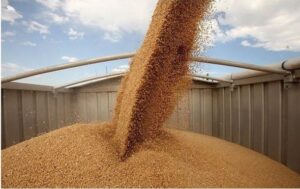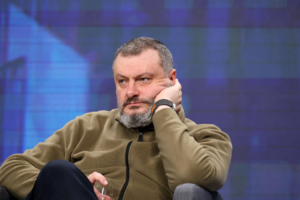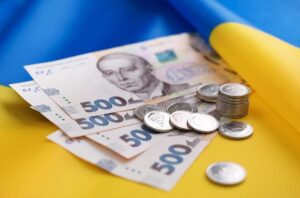
As of August 1, farmers harvested 15.47 million tons of early grains and legumes from 4 million 423.9 thousand hectares, which is 39% of the area sown with these crops, according to the Ministry of Economy.
Last year, as of August 2, 25.29 million tons of grain were harvested from 6 million 106.1 thousand hectares, which means that the current figures are 38.8% and 27.5% lower, respectively, and the average yield, which is 3.5 tons/ha, is 15.6% lower.
According to the Ministry of Economy, 11.36 million tons of wheat were harvested from 3 million 54.2 thousand hectares (last year – 19.44 million tons from 4 million 465.8 thousand hectares), barley – 3.57 million tons from 1 million 14.8 thousand hectares (4.82 million tons from 1 million 294.1 thousand hectares).
The average yield of these crops this year is 3.7 tons/ha and 3.5 tons/ha, respectively, which is 14.6% and 5.5% less than last year’s figures.
At the same time, this year’s pea harvest is already higher than last year’s – 0.49 million tons from 208,200 hectares compared to 0.45 million tons from 205,700 hectares, and the yield is 7.7% higher at 2.4 tons/hectare.
Other cereals and legumes were threshed on an area of 145,500 hectares, with a harvest of 50,400 tons.
It is noted that among the leaders are, in particular, the Odessa region with 0.09 million tons from 1 million 70.4 thousand hectares, the Kirovograd region with 1.93 million tons from 462.9 thousand hectares, and the Poltava region with 1.52 million tons from 344.7 thousand hectares.
Farmers in the Dnipropetrovsk and Kherson regions have begun threshing millet, harvesting 83 tons from an area of 1,200 hectares, the Ministry of Economy added.
According to its data, as of August 1, 1.76 million tons of rapeseed had already been harvested from an area of 781,900 hectares, while last year on August 2, 3.24 million tons were harvested from 1,195,500 hectares, and the average yield is 16.8% lower than last year’s on this date and amounts to 2.3 tons/hectare.
As reported, the National Bank of Ukraine, in its Inflation Report published on Friday night, lowered its forecast for this year’s grain harvest from 61.7 million tons to 57.9 million tons, and for oilseeds from 22 million tons to 21 million tons.
The NBU recalled that last year, the grain harvest in Ukraine fell to 56.2 million tons from 59.8 million tons in 2023, while oilseeds fell from 21.7 million tons to 20 million tons.

The indirect cost of housing construction in Ukraine in the second quarter of 2025 increased by 2.8% compared to the previous quarter and by 14.3% to the same quarter of 2024, it follows from the indices of indirect cost of housing construction in the regions of Ukraine approved by the Ministry of Development of Communities and Territories (Ministry of Development).
The relevant document establishes indirect indicators of the cost of housing construction, calculated as of July 1, 2025. According to it, the average indicator in Ukraine is 25.3 thousand UAH/square meter, while on July 1, 2024 it was 22.2 thousand UAH/square meter.
According to the Ministry, the indirect cost of construction of 1 square meter of housing in Kiev in the second quarter rose to 29.6 thousand UAH, in Kiev region – to 25.3 thousand UAH, in Lviv region – to 25.2 thousand UAH, in Zakarpattya region – 22 thousand UAH, Ivano-Frankivsk region – 22.8 thousand UAH, Odessa region – 24.3 thousand UAH, Dnipropetrovsk region – 24.6 thousand UAH. Also high indicators are set in Kharkiv and Donetsk regions – 26.6 thousand UAH/sq. m.
cost of construction, HOUSING, statistics by regions, UKRAINE

Ukraine exported 24.406 thousand tons of honey in January-June 2025, which is 1.9 times less than in the same period of 2024, when 48.113 thousand tons of this product was supplied to foreign markets. According to statistics released by the State Customs Service (SCS), revenue from honey sales for the period amounted to $53.261 million, which is 41.7% less than for the same period last year, when revenue amounted to $91.417 million.
The top three importers of Ukrainian honey in January-June 2025 were Germany, which accounted for 22.86% of purchases worth $12.177 million, Spain – 10.83% and $5.769 million respectively, Poland – 9.77% and $5.2 million respectively.
A year earlier, during the same period, the most active importers of sugar from Ukraine were Germany (25.76% at $23.546 million) and Poland (10.16% at $9.288 million), as well as the United States (15.27% at $13.955 million).

According to information published in the Ukrainian media, former Secretary of the National Security and Defence Council (NSDC) of Ukraine Oleksandr Litvinenko may become the next Ukrainian ambassador to Serbia. This was reported by Verkhovna Rada deputy Oleksiy Goncharenko on his Telegram channel, citing sources in the presidential administration.
It is reported that Vladimir Zelensky will soon approve Litvinenko’s appointment to the diplomatic mission in Belgrade by decree.
There has been no official confirmation from the Office of the President or the Ministry of Foreign Affairs of Ukraine yet.
Oleksandr Valeriyovych Litvinenko, born on 27 April 1972 in Kyiv, is a Ukrainian statesman and public figure.
Education: graduated from the Institute of Cryptography, Communications and Informatics of the Russian FSB Academy (1994), received academic degrees in Kyiv and London.
He began his career in the Security Service of Ukraine (1994–1998), then held positions in the National Security and Defence Council, the Security Service and the National Institute for Strategic Studies.
In 2021–2024, he headed the Foreign Intelligence Service of Ukraine.
On 26 March 2024, by presidential decree, he became Secretary of the National Security and Defence Council, holding this position until July 2025, after which he was dismissed.
Litvinenko is a Doctor of Political Science, professor, major general, and Honoured Worker of Science and Technology of Ukraine.
According to Volodymyr Zelenskyy, Litvinenko is ‘a professional with an excellent reputation,’ and he himself is a key figure in the formation of diplomatic strategies.
It is expected that after the decree is signed, the appointment will be sent to the Serbian Assembly for approval. If the candidacy is approved, Alexander Litvinenko will head the Ukrainian diplomatic mission in Belgrade.
The main task is to strengthen bilateral political and economic dialogue, strengthen Ukraine’s position in the Balkans and promote European integration.
The appointment of Oleksandr Litvinenko as Ukraine’s ambassador to Serbia reflects Kyiv’s desire to strengthen its diplomatic presence in the Balkans. His experience working in the National Security and Defence Council, the Foreign Intelligence Service, and strategic institutions makes him a strong candidate for strengthening Ukrainian-Serbian relations.

This amount of revenue is UAH 37.6 billion, or 13.4% more than in the same period of 2024. Among the main budget-forming goods that provided the largest revenues in January-June 2025, the following are in the lead:
– petroleum products – UAH 71.1 billion;
– passenger and freight vehicles – UAH 30.3 billion;
– petroleum gases – UAH 9.3 billion;
– mineral fertilizers – UAH 6.8 billion;
– fungicides, herbicides – UAH 6.0 billion;
– telephone sets – UAH 4.1 billion;
– cigars, cigarillos, and cigarettes – UAH 4.0 billion;
– coal – UAH 3.9 billion.
The main budget-forming goods, whose import growth ensured a significant increase in customs revenues in the first half of this year compared to the same period last year, were:
– petroleum products – by UAH 8.2 billion;
– petroleum gases – by UAH 4.8 billion;
– passenger cars – by 3.7 billion UAH;
– cigars, cigarettes, cigarillos – by 3.2 billion UAH;
– coal – by 2.3 billion UAH;
– agricultural machinery and equipment – by 1.1 billion UAH;
– electricity – by 1.1 billion UAH.
In turn, customs revenues were affected by a steady increase in the share of customs duties assessed on the import of certain goods into Ukraine in accordance with the legally approved list of exemptions. Thus, the total amount of customs duty exemptions on imports of goods in January-June of this year amounted to UAH 140.12 billion, which is 42% or UAH 41.61 billion more than in January-June 2024.